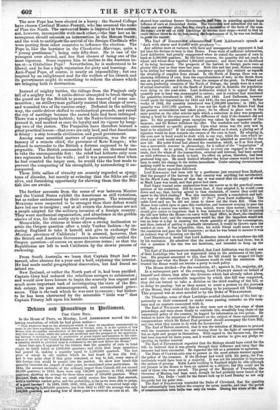Instead of mighty battles, the tidings from the Punjaub only
tell of a mighty row. A cattle-driver attempted to break through the guard set by the British to protect the removal of some am- Munition; an artilleryman gallantly resisted that charge of cows, and wounded two of the vaccine army. Defeated in the military way, the cattle-driver shifted to ecclesiastical grounds, and raised the cry of sacrilege because the sacred hide had been infringed. There was a prodigious hubbub ; but the Native Government sup- pressed it, and marked at once its loyalty and its vigour by hang- ing two of the rioters. The Punjaubis have therefore learned a great practical lesson—that cows are only beef, and that fanaticism is felony : a step towards civilization and good government. Among some unsettled matters of speculation, was the con- tumacy of a remote chief, the governor of Kote Kangra ; who tensed to surrender to the British a fortress supposed to be im- pregnable. The British commander had sent six thousand men to take the unconquerable fort : the rebel had hitherto only seen two regiments before his walls ; and it was presumed that when he had counted the larger sum, he would take the best mode to prevent the conquering of his stronghold, by surrendering it un- conquered. These little sallies of vivacity are scarcely regarded as symp- toms of disorder, but merely as evincing that the Sikhs are still alive, and furnishing opportunity for showing them that the Bri- tish also are awake.


























 Previous page
Previous page